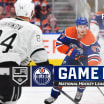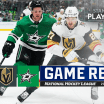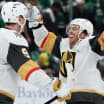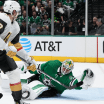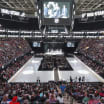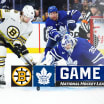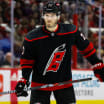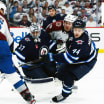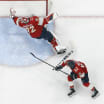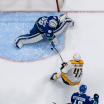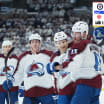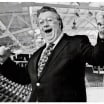NHL.com's Q&A feature called "Five Questions With …" runs every Tuesday. We talk to key figures in the game and ask them questions to gain insight into their lives, careers and the latest news.
The latest edition features Minnesota Wild coach John Torchetti:
Five Questions with John Torchetti
Minnesota coach discusses taking over faltering Wild, getting them into playoffs
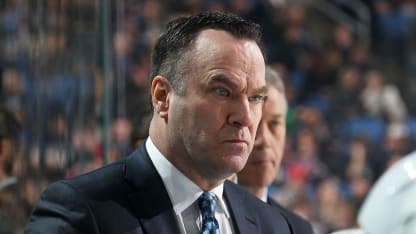
© Bill Wippert/Getty Images
Minnesota Wild coach John Torchetti has been using smelling salts to fire himself up before games ever since his playing days as minor-league left wing. He says it just works for him and, frankly, that's all that matters.
But Torchetti didn't need his smelling salts to get him going when he was named Minnesota coach Feb. 13. He felt a turnaround was possible, even though the Wild were 1-11-2 in their last 14 games under former coach Mike Yeo.
"They had been a playoff team the prior years," Torchetti said, "so I think we just had to get everybody working on the same page and being a better checking team."
Torchetti, who studied the Wild while coaching their American Hockey League affiliate in Iowa, has made it happen. Despite losing its past three games, Minnesota is 15-9-1 since Torchetti coached his first game Feb. 15.
The Wild, who won their first four games under Torchetti, will clinch a berth in the Stanley Cup Playoffs with a win against the San Jose Sharks on Tuesday. They can also clinch if the Colorado Avalanche lose at the Nashville Predators.
"I think we had to work a little bit smarter and just build some more confidence with the players to just keep playing the right way and good things will happen," Torchetti said. "We happened to get off on the right foot on that Western road trip and we just kept building from there."
Torchetti talked more about the Wild, why they've lost three in a row but also how they rebounded to be on the verge of clinching a playoff berth, in a phone interview with NHL.com on Monday.
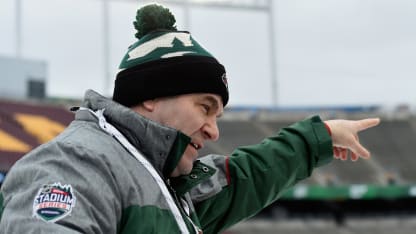
© Hannah Foslien/Getty Images
Here are Five Questions with…John Torchetti:
The Wild won six in a row and now have lost three in a row. What has changed in the team's overall game in the past three games, and how do you fix it?
"I think our details and the urgency to win battles. I think we're waiting for the next guy beside us to do the job. We have to play a better checking-mentality game for 60 minutes. I think against Ottawa we came alive more in the second half of the game, and then a puck goes off our centerman's skate going out in front and we lost the game, so that was a tough one. Against Detroit, we played good, but not good enough. Detroit wanted it more. And I think we just thought we were going to show up and Winnipeg was going to give us two points. We didn't battle like we should. That's the mindset we have to have moving forward. That's why we won six in a row at one point. You forget how much hard work you've gotta do to even put yourself in this position to have an opportunity to clinch.
"The bottom line is we've gotta get into the playoffs. If we make the playoffs, I think everyone will breathe a little easier and get back to playing our game better."
It's pretty amazing, though, if you look at the totality of this. The Wild were a 1-11-2 team in their previous 14 games before you got there. They are 15-9-1 since you arrived. So, let me ask you this: What was the state of the team when you got there and what's the state of the team now, even considering the three-game losing streak?
"It's always confidence with the players. They've gotta trust each other. It's no reflection on anybody. It's the whole organization from top to bottom. We always have to keep building confidence with the team, and it wasn't there [when I took over]. Now, I think we're capable to bounce back quicker. We started out 4-0 and lost three in a row. Then we went 4-0 and lost [four of the next five games]. Then we went 6-0 and lost three in a row. We have the adaptability to bounce back, but we've gotta be able to stay engaged and keep consistent with our game. That's the thing we're trying to get across. We've gotta be consistent more through a 10-game segment.
"The No. 1 thing moving forward is I coach for the logo, for the team. You play for the team and how you play is how you get your ice time. There's no favoritism. There's no this or that. It's play the right way and you're going to be in the lineup. We have to play the right way. When we're not playing the right way, it's going to be a tougher game for us moving forward. So, I feel like in the last three games, I have to do a better job. I'm just as much at fault as anyone else. I have to do a better job of holding them accountable moving forward."
I know you're not one to publicly criticize players, but does Thomas Vanek still have a future with this team? Can Vanek be a valuable player for the Wild?
"Yeah, yeah. I mean, I thought his response when he came back in the lineup was great. He had some really good plays, some really good backchecking plays. Thomas knows that, and I think moving forward he wants to be an important part of us. For us to be really successful, we need him. He has 18 goals, so that's a big part of us. You need scorers and you need secondary scoring too. We've been doing OK with maybe two-and-a-half lines, but when he's going and we get [Jason] Zucker going, I think we'll be a tough team to beat."
It's interesting that you say you coach for the logo, which is really what it's all about, but do you also coach for yourself considering you still have the interim tag, which means you don't have a contract for next season?
"No, I don't. No. I've learned my lesson the last few years. It's all about the team. That's what it's all about. We'll let that worry about itself later on. We're focused on getting to the playoffs. That's the No. 1 thing. If you're worried about a contract, I think you coach the game differently."
You've had two other stints as an interim coach, but your history is mostly as an assistant coach in the NHL. Did you wonder or worry about getting another chance to be a head coach in the NHL?
"Oh yeah. I feel that the steps that I was taking back to it, that I was going to get an opportunity. Just keep developing the kids. When people know that you can develop players, especially young guys, because the NHL is going toward more young players playing, it's a big benefit for me.
"I enjoyed my time in Iowa, and the year in Russia really helped me about being patient more because the game has changed with the type of players you are coaching. It's more of a 1-on-1 game in Russia, and then you're trying to bring the team game in with you. That's the No. 1 thing structure-wise. And then you have the language barrier, and I think sometimes with your explanation, your film, you have to be more detailed. You know how people say you have to walk before you run. In Russia, you gotta crawl, walk and then run. It helped me a great deal.
"Now dealing with players when they're not playing up to par, I think I'm able to watch film with them, go over certain situations, show them certain situations where they can do a better job maybe offensive or on forechecks or on defensive responsibility, show them why their game is not on track and get them back on point quicker that way. Honesty is one of the biggest things I have with the players; being direct but also knowing I need that player to help us win a game."
